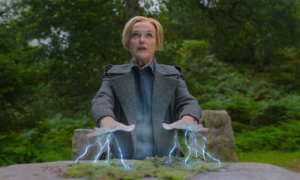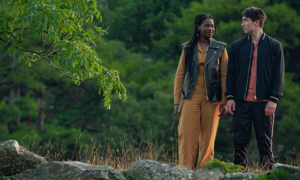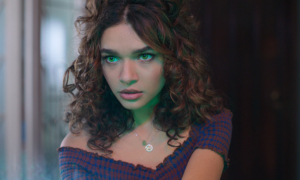Based on the popular animated series Winx Club, Netflix’s Fate: The Winx Saga follows a group of female fairy friends – Bloom, Stella, Terra, Musa, Aisha and (newcomer for Season Two) Flora – who are attending the magical Alfea College for Fairies.
After last season’s explosive finale which saw fire fairy Bloom (Abigail Cowen) transform, Alfea taken over by a militant authority by former Headmistress Rosalind (Miranda Richardson), and current headmistress Dowling ‘disappearing’, it’s safe to say that things have changed quite dramatically for our favourite group of fairies in Season Two.
“Now that Rosalind is the new headmistress there’s a big shift, and she’s gonna run things way differently than how Dowling did it. And maybe not in a good way…” says Cowen.
“It’s a very intense change because we’ve lost a very beloved headmistress at the end of the first season and you kind of find them in a very militaristic, fascist, zone,” adds Eliot Salt who plays fellow fairy Terra. “There’s a lot more violence and a lot more rules…”

The first season of the show was well-received by new and established fans (bar a couple of elements that we’ll get to later) and the second series was greenlit by Netflix almost immediately after the first season came out back in January 2021. For a streaming platform packed to the brim with genre shows and a slight aversion to continuing them (I Am Not Okay With This, The Society, The Dark Crystal: Age of Resistance, V Wars, The Irregulars…) it was somewhat surprising that Fate received the hallowed second season…
“I think it was a combination of a lot of love going into the show from where it originated from and then also the people who brought it to life in the reimagining of it,” says Hannah van der Westhuysen who plays light fairy Stella when we ask her why she thought Season One resonated so much with audiences. “But also, the timing of it being during a pandemic, which was a really scary time when people needed escapism and the ability to just step out of this world.
“It was just really nice to feel fully invested and immersed in something that had the sentimentality and nostalgia of childhood mixed with the exciting stakes of being slightly older and figuring out your way in the world, which is something that conceptually everyone could relate to.”
“I think that there’s a lot of relatable topics and elements to the show in general,” agrees Cowen. “It deals with a lot of real life problems that not only teenagers go through, but that grown people go through as well. I think that people were really able to relate to that. And then also the fact that it was a fantasy show in a time when people really kind of wanted to step out of reality. I think that that was a big factor in it as well.”
This season, the stakes have certainly been upped and our core group of fairies have all changed along with it. For Bloom, her aforementioned transformation into a fully-fledged fairy (with wings and all) has meant she’s feeling a lot of responsibility (and emotions) this season: “In the new season she is coming into her powers and she’s maybe a little too cocky at times with it! But then she’s also dealing with the insecurity revolving around her parents and also the guilt of releasing Rosalind and the way that it’s impacting the school. So it’s a whole mix – once again – of emotions for Bloom!”

Speaking of emotions, Musa (who’s power is to feel other people’s emotions) is having some difficulty around her power too. Well, feeling other people’s emotions at a school full of hormonal teenagers can’t be fun… “Musa is trying to understand herself [in season two] and her fight to understand herself gets stronger. It will be quite surprising with how far she would go in order to understand herself and her surroundings…”
Musa isn’t the only one trying to understand herself. Water fairy Aisha (Precious Mustapha) has always been the straight-talking, unphased member of the group. However, this season, that seemingly unbreakable barrier she puts up is cracked with a new character and love interest in the form of Grey (played by Brandon Grace).
“I think [Brandon] is such an incredible actor. We just always had fun on set. I loved working with him,” says Mustapha. “I feel very connected to Aisha, so it was really nice to come back to her and play her in a way where it was different to season one because now she’s going through this journey of falling in love and exploring that.”

After backlash last year about the show’s queer representation, and switching out the Latina character of Flora with the white character of Terra, Season Two of Fate is working on righting that.
First of all, Season Two see’s the introduction of Flora (played by Paulina Chávez) – who enters the show as Terra’s cousin.
“I was very nervous,” Chávez says of joining the show. “They made me feel very at home and they’ve become my family really!
“As a Latina, it’s very important to have representation on screen and it’s good that it’s happening. That’s what’s important. We’re doing the work and every step by step we’re going the long mile. Flora is very loved. I love her. I loved her growing up and I know people are going to really enjoy her on screen.”

That’s not the only element that’s being addressed in Season Two. The show’s queer representation is being increased with Terra realising she’s attracted to women, resulting in a very sweet coming out scene with her and her friends: “It really was an emotional scene to film,” says Eliot Salt who plays Terra. “I wasn’t expecting it to be. I felt very anxious about it when we did the scene with all of us, but it was so lovely. It made it nicer because I really was genuinely quite distressed and afraid. Then the wave of warmth that she gets offered… it was lovely to be in. It was so nice.
“I’m delighted that she comes out this season and it’s just such a privilege to tell a story that I so wish had existed when I was growing up.”
Indeed, an element that has really shone through on the show is the positive representation of female friendship: a group of women who genuinely love and support each other, which seems to be a fair reflection of the women who play them: “We all get along really really well,” says Mustapha. “It feels very organic and I think we just all feel very lucky that it’s ended up that way.
“It’s basically just a reflection of us to be honest, because we’re all just chaotic [haha] but fun!”
Fate: The Winx Saga is out now on Netflix
